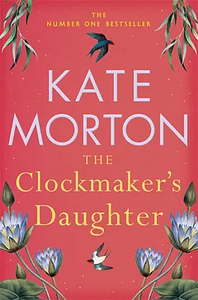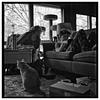Take a photo of a barcode or cover
It wasn't my favorite of Morton's, but I did enjoy it. It was a bit hard to keep track of all of the characters. The ending was a surprise, though. I wasn't expecting that scenario.
Even though they all follow a pretty recognisable check list of circumstances and narrative qualities, I always end up enjoying Kate Morton's novels. The Clockmaker's Daughter took me a while to become involved in the story line, which took up and followed a truly staggering number of different time periods; and I also unfortunately never became super invested in the modern-day protagonist in the narrative. She was entirely two-dimensional and not interesting in the slightest. Regardless, I enjoyed the character of the house itself and the lore around its captivating draw for the principal characters across the novel's timeline enough for this to be a four star read for me.
Love a good historic mystery. This one is told from so many voices through history and it all ties up neatly in the end.
I love Kate Morton and often recommend her to fans of historical fiction (which, admittedly, is not my usual genre of choice, but her ability to blend timelines and mysteries is usually thoroughly enjoyable). Unfortunately, this one fell a little flat to me. The writing is still beautiful, her ability to set the scene and transport you to a place is amazing.
My main problem with this book is that there are SO many characters and each has it's own time period and point of view. It's abrupt and jarring to try to skip back and forth between them. In the end, because there were so many threads to tie up, I didn't feel as though any of them were settled in a satisfying way. There were too many questions. Also, I wanted to see some character resolution that never happened.
(Spoilers ahead now)
I was also completely annoyed by Lucy's decisions. She was supposed to be a woman of facts and logic who loved her brother completely, yet she chose to allow him to live a life of anguish when she could have given him all the answers. Then, she gets rid of all the evidence with the hope that someday a person will find it. Why? Why didn't she just tell everyone? I guess she wanted to start her school without interruption, but that wasn't a success anyway so she could have said something after that point.
When did Edward and "Pale Joe" meet? And why did he give him that satchel? Did Edward commit suicide? Did he want someone to carry on the memory of Birdie? Why did Joe feel guilty about it? Nothing was mentioned about this.
I don't know, maybe I need to read it again to put all the pieces together, but it's a long book so that probably won't happen.
My main problem with this book is that there are SO many characters and each has it's own time period and point of view. It's abrupt and jarring to try to skip back and forth between them. In the end, because there were so many threads to tie up, I didn't feel as though any of them were settled in a satisfying way. There were too many questions. Also, I wanted to see some character resolution that never happened.
(Spoilers ahead now)
I was also completely annoyed by Lucy's decisions. She was supposed to be a woman of facts and logic who loved her brother completely, yet she chose to allow him to live a life of anguish when she could have given him all the answers. Then, she gets rid of all the evidence with the hope that someday a person will find it. Why? Why didn't she just tell everyone? I guess she wanted to start her school without interruption, but that wasn't a success anyway so she could have said something after that point.
When did Edward and "Pale Joe" meet? And why did he give him that satchel? Did Edward commit suicide? Did he want someone to carry on the memory of Birdie? Why did Joe feel guilty about it? Nothing was mentioned about this.
I don't know, maybe I need to read it again to put all the pieces together, but it's a long book so that probably won't happen.
Just as good the 2nd time around. Characters rendered beautifully in a tale full of suspense, intrigue, and depth.
I could have skipped the opening chapter (and might have enjoyed the book more if I had, since it just confused me). The book was a bit disjointed as I read through it. In retrospect, I wish I had kept paper and pen next to me so I could have made the connections between the various characters as I went. I think that would have increased my enjoyment.
It has been a while since I read a book and wanted to be writing down quotes as I went. This book was full of lines that distilled complex ideas about life and legacy and memory into one or two lovely sentences. I did manage to mark this, after regretting that I had failed to take note of a quote from earlier in the book.
“You’re too young to understand, I expect, but when one gets old, all memories have a weight, even the happy ones.”
From the “popular highlights” on Kindle, I liked these:
“Parents and children. The simplest relationship in the world and yet the most complex. One generation passes to the next a suitcase filled with jumbled jigsaw pieces from countless puzzles collected over time and says, ‘See what you can make out of these.’”
“... one must forgive oneself the past or else the journey into the future becomes unbearable.”
“Human beings are curators. Each polishes his or her own favored memories, arranging them in order to create a narrative that pleases. Some events are repaired and buffed for display; others are deemed unworthy and cast aside, shelved belowground in the overflowing storeroom of the mind. There, with any luck, they are promptly forgotten. The process is not dishonest: it is the only way that people can live with themselves and the weight of their experiences.”
It has been a while since I read a book and wanted to be writing down quotes as I went. This book was full of lines that distilled complex ideas about life and legacy and memory into one or two lovely sentences. I did manage to mark this, after regretting that I had failed to take note of a quote from earlier in the book.
“You’re too young to understand, I expect, but when one gets old, all memories have a weight, even the happy ones.”
From the “popular highlights” on Kindle, I liked these:
“Parents and children. The simplest relationship in the world and yet the most complex. One generation passes to the next a suitcase filled with jumbled jigsaw pieces from countless puzzles collected over time and says, ‘See what you can make out of these.’”
“... one must forgive oneself the past or else the journey into the future becomes unbearable.”
“Human beings are curators. Each polishes his or her own favored memories, arranging them in order to create a narrative that pleases. Some events are repaired and buffed for display; others are deemed unworthy and cast aside, shelved belowground in the overflowing storeroom of the mind. There, with any luck, they are promptly forgotten. The process is not dishonest: it is the only way that people can live with themselves and the weight of their experiences.”
I love the way K. Morton makes the setting an integral part of the story and this latest book is no different.
mysterious
tense
slow-paced
Plot or Character Driven:
Character
Strong character development:
Complicated
Loveable characters:
Complicated
Diverse cast of characters:
No
Flaws of characters a main focus:
Yes
I wanted to like this more than I did. The storyline was a little too scattered, and the connections too stretched.
I would say that this was not one of my favorites from this author. I really liked it until about 2/3 of the way through and then I felt the ending was rushed and it just didn’t tie it together as well as I had hoped. Possibly I even liked it until 3/4 through but the whole last few chapters felt rushed.



